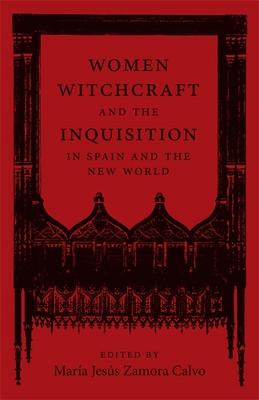Women, Witchcraft, and the Inquisition in Spain and the New World investigates the mystery and unease surrounding the issue of women called before the Inquisition in Spain and its colonial territories in the Americas, including Mexico and Cartagena de Indias. Edited by Mara Jess Zamora Calvo, this collection gathers innovative scholarship that considers how the Holy Office of the Inquisition functioned as a closed, secret world defined by patriarchal hierarchy and grounded in misogynistic standards.
Ten essays present portraits of women who, under accusations as diverse as witchcraft, bigamy, false beatitude, and heresy, faced the Spanish and New World Inquisitions to account for their lives. Each essay draws on the documentary record of trials, confessions, letters, diaries, and other primary materials. Focusing on individual cases of women brought before the Inquisition, the authors study their subjects' social status, particularize their motivations, determine the characteristics of their prosecution, and deduce the reasons used to justify violence against them. With their subjection of women to imprisonment, interrogation, and judgment, these cases display at their core a specter of contempt, humiliation, silencing, and denial of feminine selfhood. The contributors include specialists in the early modern period from multiple disciplines, encompassing literature, language, translation, literary theory, history, law, iconography, and anthropology. By considering both the women themselves and the Inquisition as an institution, this collection works to uncover stories, lives, and cultural practices that for centuries have dwelled in obscurity.
Book
Women, Witchcraft, and the Inquisition in Spain and the New World
(Write a Review)
Unfortunately this title is no longer available
Women, Witchcraft, and the Inquisition in Spain and the New World investigates the mystery and unease surrounding the issue of women called before the Inquisition in Spain and its colonial territories in the Americas, including Mexico and Cartagena de Indias. Edited by Mara Jess Zamora Calvo, this collection gathers innovative scholarship that considers how the Holy Office of the Inquisition functioned as a closed, secret world defined by patriarchal hierarchy and grounded in misogynistic standards.
Ten essays present portraits of women who, under accusations as diverse as witchcraft, bigamy, false beatitude, and heresy, faced the Spanish and New World Inquisitions to account for their lives. Each essay draws on the documentary record of trials, confessions, letters, diaries, and other primary materials. Focusing on individual cases of women brought before the Inquisition, the authors study their subjects' social status, particularize their motivations, determine the characteristics of their prosecution, and deduce the reasons used to justify violence against them. With their subjection of women to imprisonment, interrogation, and judgment, these cases display at their core a specter of contempt, humiliation, silencing, and denial of feminine selfhood. The contributors include specialists in the early modern period from multiple disciplines, encompassing literature, language, translation, literary theory, history, law, iconography, and anthropology. By considering both the women themselves and the Inquisition as an institution, this collection works to uncover stories, lives, and cultural practices that for centuries have dwelled in obscurity.Hardcover
$50.00